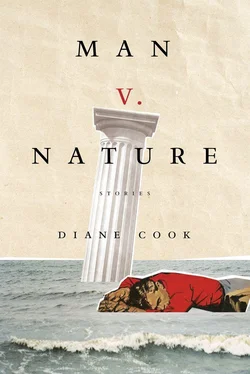“Janet. Please.” He ducked her. “It’s not a good time,” he muttered, ushering the girl to the door.
What could that mean? She felt giddy. Dave’s got a problem? “I’ll always be there for you. And I know you know where to find me,” she called, and he paused, just briefly. She could see a tension — the good kind, she thought — pulse down his back. From his stuttered step, Janet thrillingly anticipated the ruin of everything. She wanted him to scold her again. Then half smile in the way she liked. She would know that he couldn’t forget, was haunted by her in the same way she was by him. Maybe he’d ended up with what he really wanted, but there had been moments when Janet had clouded the picture. And she could do it again. She’d just done it. He would think of her tonight. She knew it. Then strangely, shamefully, she wanted to take it back. Her offer felt false, and yet she’d said it. Was that what she really wanted? More of that? Or did she want something new? She hated all this dry thinking. In a daze, Janet shuffled over to the window.
Dave unlocked his car, and his little girl lifted the back door handle, needing all her strength to pull it open. The girl climbed into the car seat, and Dave buckled her in, tenderly now that they were alone.
Maybe it wouldn’t be so bad to have a child who was just like her. It would be a place to put what Janet knew. All of it. And children bring other, unexpected things. Certain perks. Maybe Meredith and Dave hadn’t fallen quickly in love, as much as their lust begat a baby that began their family. Janet hadn’t considered lapsing on birth control to get Dave’s attention. She’d assumed what life had to offer wouldn’t require compromises. And a child had always felt like the biggest compromise. But the strings attached didn’t have to be bad strings, did they? Strings might have secured a good life. Strings might have tied her to Dave. If she’d played this wrong, she could make up for it easily enough, couldn’t she? Whenever Dave showed up at her door, hat in hand. If he showed.
Or.
Maybe she could secure that life tonight, when her phys ed teacher arrived with wine and a roast chicken from the supermarket.
Or maybe they could just talk about it.
You can always change your mind, Janet thought with an ache as she watched that little Santana girl turn toward her. Behind the car window, she made what looked like a kissing face and wiggled it all around. Janet blushed and blew a childish kiss back. But then the girl pinched her nose, and Janet could see that in reality there had been no affection; the girl had been making a scrunched, sour, taunting face all along. You stink , was what she meant.
“Linda means ‘beautiful’ in Spanish,” the man in her bed whispers.
“My name is Lydia,” she whispers back.
In the morning he is sitting on her kitchen counter drinking a beer, his ankle crossed over his knee, his belt buckle still dangling, his mustache glistening from some unknown wetness.
“I thought you’d be gone,” says Lydia.
“I mean to be.” He gulps the last of the beer and walks past her, pinching her ass on the way out.
While folding laundry, she finds a tiny blue sock that isn’t hers and wonders if the man left it accidentally and it shrank in the wash, or if he left it and his feet (or at least one of them) are amazingly petite. She can’t remember his feet. His name might have been Raul.
The next week, she finds a small red mitten in with her whites, the wool felted from the hot water wash. It could have shrunk, she thinks, remembering the particular style of Doug, with his crisped shiny hair, his colorful thigh tattoo. It could be a fashion statement. But it is late May; the time for wool mittens is over.
Next, a small pumpkin-colored T-shirt appears in the dryer, Billy stitched in blue thread across the tiny chest. The neck is so small she cannot get her head through. Could it have shrunk too?
“Is this yours?” She holds it up for the man eating a Pop-Tart at her table, who studies the shirt from his chair.
“No,” he says finally. “My name is John.”
On her bed, she lays out a small empty child with the clothes from weeks of laundry. Little Billy’s orange T-shirt, the blue sock and the mitten on the right, a pink ruffled girl’s sock for the left foot. A pair of blue jean overalls, from Sears, size L, 3 to 5 years. A corduroy jacket — the most recent find — with patches from Disney World and Lionel Trains sewn on with mismatched thread.
The variations in size give the empty child a disfigured look.
She fingers the T-shirt material, and it is too soft. The lack of friction irritates her, like rubbing two chalk-covered fingers together. She picks up the jacket. Who sews patches onto clothing anymore? Who plays with trains? She picks at the thread and the patch loosens from the fabric. The exposed corduroy looks brand new and is soft like velvet.
She’s hoping Frank will stay the night, but it would be bad for him to see this.
She gathers the clothes into a black plastic bag, intending to throw it away, but instead places it in the corner of the kitchen nearest to the laundry room. That night, she hustles Frank straight to her bedroom. “You sure know what you want,” he says as she’s flipping open his belt.
She sorts a frilly robin’s-egg-blue girl’s dress from a load of towels and storms into the kitchen, where Cal is standing in front of the open refrigerator.
“Don’t you have anything stronger than milk?” he asks.
She throws the dress at him, and it lands quietly at his feet. “You planted this in my dryer.”
He picks up the dress. “No, hon, it’s not my size.” He smirks, holding the dress against his bare chest. He begins to waltz with it. “La da dee,” he hums. The hem caresses his navel, and the top just covers his left pec.
“This isn’t a game,” she says, folding her arms and gazing out the window sternly like she’s seen in movies when women put their foot down about something. “Get out.”
She waits until his car revs down the street before sitting down to eat the toast points she carefully cut the way he likes, dipping them in jam and chewing them with disgust. She doubts Cal will be back. She’s only known him for a few weeks, but she will miss him. She spits a chewed toast point onto the plate.
For a while she keeps her laundry to a minimum, wearing the same underwear for days to avoid finding some unwanted article of clothing in with her delicates. But now she is washing every towel she uses, every bra and pair of socks and jeans, every blouse she wears each day. Just to see. And each day some tiny article of clothing emerges with her clean clothes. The pale blue turtleneck with a sleepy turtle stitched on the front. The little T-shirt with the grass stain on the sleeve. The sweater emblazoned with a rainbow. Striped athletic socks. Superhero underwear. Clothes belonging to children named Patrick, Anna, Ned, Stacy, Jack, Heather.
The bag is stretched to the point of bursting, and she can’t keep her eyes off it.
Her dad pours her another glass of wine and then wiggles the bottle in front of her face. He likes to bring nice wine when he comes for dinner.
She licks the corner of her napkin, absently reaches up to wipe away the wine he dribbled down his chin.
“Want me to take the garbage out?” he asks, following her gaze to the trash bag in the corner.
She shakes her head. “No,” she says. “I’ll do it.” She picks up the bag and drags it upstairs, nestling it into the corner of her room where the dog bed used to sit, cozy between two curtained windows.
He’s reaching across the table, cutting her steak, when she returns. She pushes the plate closer to him, and he helps himself.
Читать дальше












